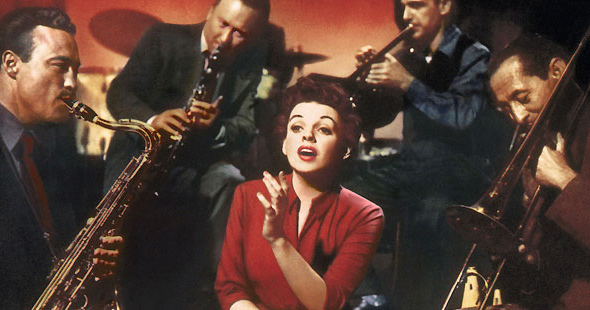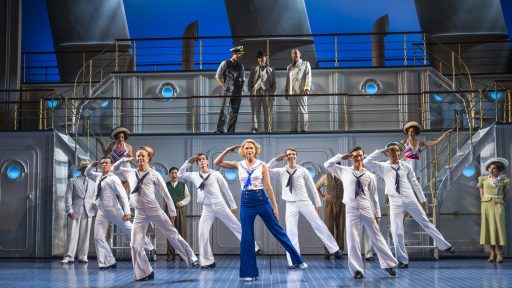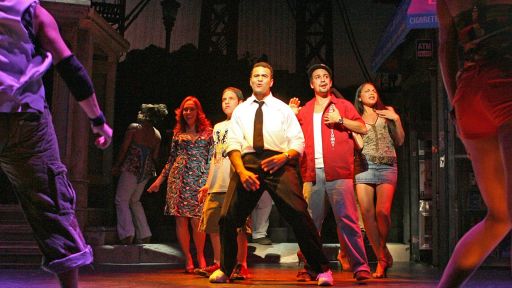In 1938, TIME magazine wrote these prophetic words: “As Rodgers and Hart see it, what was killing music comedy was its sameness, its tameness, its eternal rhyming of June with moon. They decided it was not enough to be just good at the job; they had to be constantly different also. The one possible formula was: Don’t have a formula; the one rule for success: Don’t follow it up.”
That concisely sums up the phenomenon of two Broadway giants who came to symbolize “Mr. Music” and “Mr. Words.” Although in later years Rodgers produced words of his own and collaborated as well with Stephen Sondheim and Arthur Laurents, in his peak years he had only two partners — Lorenz Hart and Oscar Hammerstein II. So close were these partnerships that no one ever spoke of a “Rodgers musical.” It was always a “Rodgers and Hart” or a “Rodgers and Hammerstein” show.
Rodgers met Hart in 1918 at New York’s Columbia University. Both were aching to break into the theater, and they found themselves in immediate agreement that poetry and wit were needed to replace the banalities of the musicals of the time. One of their first efforts — and their first published song — was “Any Old Place with You,” which was used in the 1919 show “A Lonely Romeo.” Rodgers was only 17; Hart was 24.
Although they contributed more songs to other shows and revues, the first musical that was truly all their own came in 1925. In “Dearest Enemy,” they abandoned the standard song-and-dance format and came up with what could only be called “a musical play,” one in which song and drama were integrated into a cohesive whole and combined with a serious subject — the American Revolution — and a set of believable characters. One wise critic at the time said: “We have a glimmering notion that someday [Rodgers, Hart, and Herbert Fields, who provided the book] will form the American counterpoint of the once great triumvirate of [Guy] Bolton, [P. G.] Wodehouse and [Jerome] Kern.”
There would be several other shows before Rodgers and Hart left Broadway to spend four years in Hollywood writing songs for films such as LOVE ME TONIGHT, with Jeanette MacDonald and Maurice Chevalier; HALLELUJAH, I’M A BUM!, with Al Jolson; and THE PHANTOM PRESIDENT, with the legendary Broadway actor-singer-composer George M. Cohan.
They returned East in 1935 to create songs for Billy Rose’s mammoth Broadway musical “Jumbo,” described by one critic as an “exciting compound of opera, animal show, folk drama, Harlequinade, carnival, circus, extravaganza and spectacle.” Although Hollywood and Billy Rose sidetracked Rodgers and Hart from their determination to revamp the Broadway musical, the team got back on track in 1936 with their first enduring show, “On Your Toes.” It launched a golden era on Broadway.
“On Your Toes” was followed by “Babes in Arms” (1937), “I Married an Angel,” “The Boys from Syracuse” (1938), and climaxed with Rodgers and Hart’s masterpiece, “Pal Joey” (1940). From these musical comedies came a flood of hit songs — too many to list — but which included such American classics as “There’s a Small Hotel,” “My Funny Valentine,” “The Lady Is a Tramp,” “Falling in Love with Love,” “It Never Entered My Mind,” and “Bewitched, Bothered and Bewildered.” Hart’s words were a glorious combination of wit, sentiment, and charm, and Rodgers’ music was a seamless stream of lilting melody. These elements combined to form a trademark style for these two creative men.
In 1943, there was a break in their partnership when Rodgers teamed for the first time with Oscar Hammerstein II, a union that began with one of the most beloved and influential of all musical comedies — “Oklahoma!” But there would be a final reunion in 1943, when Rodgers and Hart revised one of their early shows, “A Connecticut Yankee.” For the new version, six songs were added, including “To Keep My Love Alive,” which turned out to be Hart’s last lyric. Already ill, he died only five days after “A Connecticut Yankee” opened triumphantly on Broadway.
–John Ardoin








